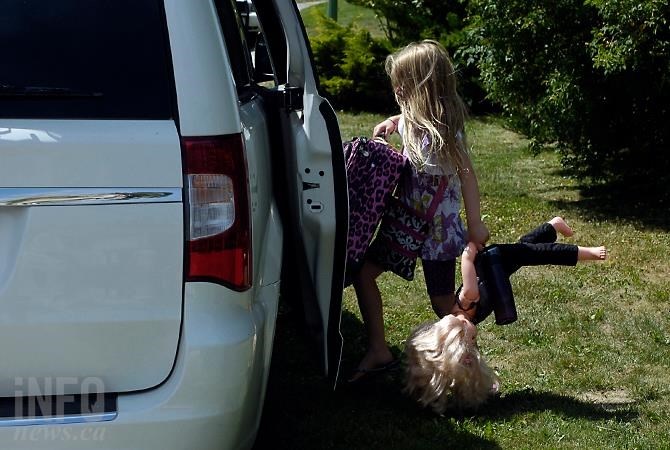
FILE PHOTO
(ADAM PROSKIW / iNFOnews.ca)
October 08, 2023 - 7:00 AM
There's no question the supports for the 11,000 evacuees from the McDougall Creek wildfire this past summer just weren’t there in a timely manner.
“It’s people power,” Jason Bedell, supervisor of the Central Okanagan’s emergency operations services, told iNFOnews.ca. “We need to have additional resources available to us when we need them. But that may just not be possible in our current climate.”
Bedell was responding to the BC Ombudsperson’s report Fairness in a Changing Climate: Ensuring disaster supports are accessible, equitable and adaptable issued earlier this week.
It looked into emergency responses from the 2021 wildfire season and followed up on a 2018 report dealing with the same issues.
One recommendation that has been implemented following that 2018 report was the creation of a system where evacuees can register online. The 2021 report says that was adopted only in some areas of the province. One of those was the Central Okanagan.
“It’s not a game changer,” Bedell said. “It’s not going to get the time frame down to anything that’s going to make us move through the lines exceptionally quicker.”
It now takes about 45 minutes for an evacuee to sit down with a volunteer and fill out all the paperwork in order to qualify for emergency assistance for things like food and accommodation.
Registering online may shorten that by a few minutes and it does cut down on clerical errors because the evacuees fill out the basic information in advance.
But they still need to meet with a volunteer, face-to-face or over the phone, so their situation can be assessed based on their needs for things like shelter and food and the state of their insurance policies.
The online system is set up to provide things like e-transfers of money and the online submission of invoices and receipts.
But Bedell said people have to be signed on to the BC Services app in order to get e-transfers. He found most evacuees this summer were not signed on so people from ServiceBC came to the emergency response centres to help them do that.
READ MORE: Mass wildfire evacuations force Central Okanagan emergency operations to rethink system
One of the jobs assigned to a new provincial task force on emergencies is to expand the online tool to “provide fully digital support for evacuees.” According to Bedell, that’s only one small part of what needs to be done.
“There are a couple of things I see as roadblocks, one of those being the people power aspect because it simply takes too long to register large amounts of people,” he said. “The other option is, we need to look at expediting the process. We can’t take 45 minutes on average to register and refer evacuees. It’s really a time calculation. We need more people or we need a quicker process.”
He didn't have suggestions on how to make that process quicker but one thing the Ombudsperson looked at is the system's surge capacity for large scale emergencies.
A mobile support team was established and in 2021 it had 20 members but the report says only two were able to be deployed that summer because they were all volunteers.
Since then, the province has hired four training specialists and expects to add two more. But that's only a drop in the bucket.
“The amount of people we would have needed here in the Okanagan would have been immense,” Bedell said. “If there was a team of 60, for example, it would have stretched them beyond capacity because there also were fires in the entire region.”
He did try to draw from other communities for help but they were busy in their own areas and could not travel to the Okanagan. Some were able assist by phone.
READ MORE: West Kelowna fire chief takes the FireSmart message to the UN
“We recognize that changes are needed in the emergency support services program, especially in how it’s delivered, but I don’t want to lose focus on the hard work and dedication our volunteers did this year,” Bedell said. “They are integral to this process and we need to set them up for success.”
Just how that’s to be done, he can’t say.
He is pleased with the Ombudsperson’s report and the direction it took.
“Emergency support services is quite rigid as it stands right now,” Bedell said. “People today have very diverse and unique needs – very different from where we were 20 years ago – so having the program look at alternative ways for people to access emergency support services with multiple options for accessing supports, not just vouchers or e-transfers, is good.
“A big one for me, and I think this is really helpful for our volunteers, is recommendation #11 that's looking at ways to aid in helping volunteers determine insurance. Does the evacuee have it readily available and is it reasonable because, if we go by the current policies, it’s pretty cut and dried. If you have insurance and you can access it, then you aren’t eligible for emergency support services.”
See the Ombudsperson’s report here.
To contact a reporter for this story, email Rob Munro or call 250-808-0143 or email the editor. You can also submit photos, videos or news tips to the newsroom and be entered to win a monthly prize draw.
We welcome your comments and opinions on our stories but play nice. We won't censor or delete comments unless they contain off-topic statements or links, unnecessary vulgarity, false facts, spam or obviously fake profiles. If you have any concerns about what you see in comments, email the editor in the link above. SUBSCRIBE to our awesome newsletter here.
News from © iNFOnews, 2023